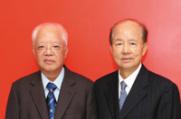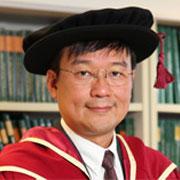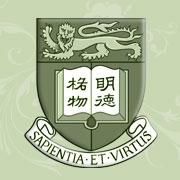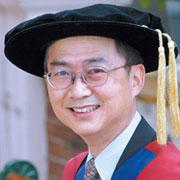
 |
黃乾亨黃乾利基金教授席 (電機工程)地球上的資源經科學化成有用物資,造福人群,知識型經濟亦以科學作為根基。這些都是工程學可貴之處。而對工程學的恆久支持,代表著我們對往後世代的投資。 黃乾亨博士及黃乾利博士 |
 |
許樹源2023年就職 |

許樹源2012年就職
Established in 1961, the Department of Electrical and Electronic Engineering is one of the largest departments in The University of Hong Kong and is dedicated to conducting leading-edge research. The Department has over 40 academic and teaching staff, and more than 40 laboratories with advanced equipment and facilities for supporting its teaching and research. Among the staff is inventor Professor Ron Hui who is a pioneer and world expert in the field of energy saving and the reduction of electronic waste. His inventions on wireless charging platform technology underpin key dimensions of Qi, the world's first wireless power standard, with freedom of positioning and localised charging features for wireless charging of consumer electronics. Professor Hui's area of expertise is in Power Electronics or the application of solid-state electronics for the control and conversion of electric power. It also refers research in electrical engineering which deals with design, control, computation and integration of nonlinear, time varying energy processing electronic systems with fast dynamics. Professor Hui received his BSc (Eng) Hons at the University of Birmingham in 1984 and a DIC and PhD at Imperial College London in 1987. He was a Lecturer at the University of Nottingham, UK in 1987–90. In 1990, he joined the University of Technology, Sydney, and was appointed Senior Lecturer at the University of Sydney in 1992, where he became a Reader in 1995. He joined the City University of Hong Kong (CityU) as Professor in 1996 and was promoted to Chair Professor in 1998. In 2001–04, he served as an Associate Dean of the Faculty of Science and Engineering at CityU. From July 2011, he holds the Chair Professorship at The University of Hong Kong and Imperial College London. Professor Hui has published over 200 technical papers, including more than 160 refereed journal publications and book chapters. Over 50 of his patents have been adopted by industry. He is a Fellow of the IEEE (USA) and IET (UK) and an Associate Editor of two respected professional refereed journals. He has been appointed twice as an IEEE Distinguished Lecturer by the IEEE Power Electronics Society in 2004 and 2006. He served as one of the 18 Administrative Committee members of the IEEE Power Electronics Society and was the Chairman of its Constitution and Bylaws Committee from 2002-10. He received the Excellent Teaching Award at CityU in 1998 and the Earth Champion Award in 2008. He won an IEEE Best Paper Award on Production and Applications of Light in 2002, and two IEEE Power Electronics Transactions Prize Paper Awards for his publications on Wireless Battery Charging Platform Technology in 2009 and on LED System Theory in 2010. In November 2010, he received the IEEE Rudolf Chope R&D Award, the IET Crompton Medal for Achievement in Power and was elected to the Fellowship of the Australian Academy of Technological Sciences & Engineering. 
吳復立2005年就職
Electrical engineering has a long tradition at the University of Hong Kong, with the Faculty of Engineering as one of the founding faculties. The team focuses on basic and applied research in the key technologies which will be central to the future developments in the electrical energy industry.
Professor Felix F. Wu joined The University of Hong Kong as the Chair of Electrical Engineering in 1995, is an internationally renowned leader in power systems engineering research and education. The broad range of advances brought about by his work have impacted significantly, and influenced extensively, research in the areas of power system planning, management and real-time control. His work is impressive for its creativity and high level of innovation. Professor Wu has authored some of the most important and frequently referenced papers on power system engineering over the last quarter century. He and his coworkers developed a unified approach to integrate the constituent components of real-time network analysis into a single framework. He has developed a complete mathematical characterization of the stability regions of power systems. This work has laid foundations which underpin current developments in direct methods for transient stability analysis, voltage stability and other possible behavior in the study of power system dynamic performance. The work of Professor Wu in the development of a solid theory for a multilateral trading model for electricity markets provided a fresh approach to evaluating simultaneously the system reliability and market economics. This work has become a basic reference in the ongoing technical and policy discussions in this area. After the North American blackout in 2003, Professor Wu was commissioned by the US Electric Power Research Institute to develop a vision of future control centers that fully utilize latest information, communication and control technologies to prevent large-scale blackouts. He has also been entrusted by various Chinese government and industry organizations to conduct research projects on a variety of issues related to power system security and economics. Professor Wu received his B.S. degree from National Taiwan University, M.S. degree from the University of Pittsburgh, and Ph.D. degree from the University of California, Berkeley. At the University of Hong Kong, he has served as Pro-Vice-Chancellor (Research) and Director of Research School from 1997 to 2000. He also holds the title of Professor Emeritus at the University of California, Berkeley. |
